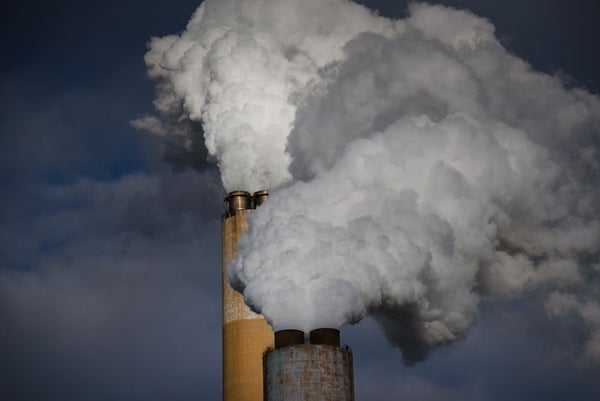CLIMATEWIRE | A move by the world’s wealthy, developed economies to end the use of coal-fired power by 2035 could further cement U.S. efforts to put an end to the most polluting form of energy and encourage other countries to follow.
G7 climate and energy officials reached an agreement to phase out coal in the first half of the 2030s during talks that started Sunday in Turin, Italy.
Under that decision, they committed to phase out “existing unabated coal power generation,” while reducing the use of coal power for energy up to 2035. They also pledged to work with other countries and the financial sector to end the approval of new coal-fired power plants “as soon as possible,” according to a communique ministers issued at the end of their meeting Tuesday.
On supporting science journalism
If you're enjoying this article, consider supporting our award-winning journalism by subscribing. By purchasing a subscription you are helping to ensure the future of impactful stories about the discoveries and ideas shaping our world today.
That communique is more a statement of intent than a binding agreement, but it would mark the first time a group of advanced economies have set a common date for a coal phase-out, sending a strong political signal that could accelerate the shift to clean energy in growing economies in Asia, analysts say.
It also signals steps those countries are planning to take to meet a landmark agreement reached at COP28 climate talks last November to transition away from fossil fuels.
“To have the G7 nations come around the table and send that signal to the world that we, the advanced economies of the world are committing to phasing out coal by the early 2030s is quite incredible,” Andrew Bowie, the United Kingdom’s minister for energy security and net zero, told Class CNBC on Monday when previewing the decision.
Most of the G7 nations — Canada, France, Germany, Japan, Italy, the United Kingdom and the United States — already have plans to shift away from carbon-rich coal use.
Only the U.S. and Japan have not declared a coal phase-out date. But the Biden administration has committed to achieving a clean power grid by 2035, which implies an even earlier coal exit. And the G7 as a whole has agreed to “fully or predominantly” decarbonize its power sectors by that time.
The decision follows EPA's release last week of new U.S. carbon standards aimed at dramatically limiting planet-warming pollution from coal-fired power plants.
While coal plants can continue to run past 2035 under those standards, they would have to be retrofitted with carbon capture technology by 2032 or make significant carbon cuts through other pollution controls — moves that would be uneconomical for most facilities and could accelerate retirements.
EPA's support documents for the rule estimate that it will result in no unabated coal after 2030. But there will still be 19 gigawatts of coal with carbon capture and storage and 1 GW of coal co-fired with natural gas by 2035.
“This G7 commitment is a further confirmation from the US that coal is on its way out sooner rather than later,” Katrine Petersen, a senior policy adviser at E3G, said in a statement.
Luca Bergamaschi, director of Italian climate change think tank ECCO, said the EPA decision really underpins the agreement among the G7, in part by putting pressure on Japan to join in.
Climate and energy ministers failed to reach an agreement on a phase-out date for coal at last year’s annual ministerial in Japan, an energy-poor country that has been one of the main obstacles to putting an end date on coal-fired power.
More than 30 percent of Japan's electricity comes from coal power, the highest among the G7, according to Ember, a climate think tank.
The G7 decision could also escalate pressure on other major coal consumers such as China to step up their efforts to wind down coal use and shift investments from coal to clean energy, said analysts.
“It is important for rich countries, that have relied so much on coal in the past, to signal to emerging countries that they are done with coal,” said Dave Jones, an electricity analyst at Ember.
To achieve a carbon-free power grid, he added, they’ll need to go beyond coal to also phase out natural gas.
Reporter Jean Chemnick contributed.
Reprinted from E&E News with permission from POLITICO, LLC. Copyright 2024. E&E News provides essential news for energy and environment professionals.
